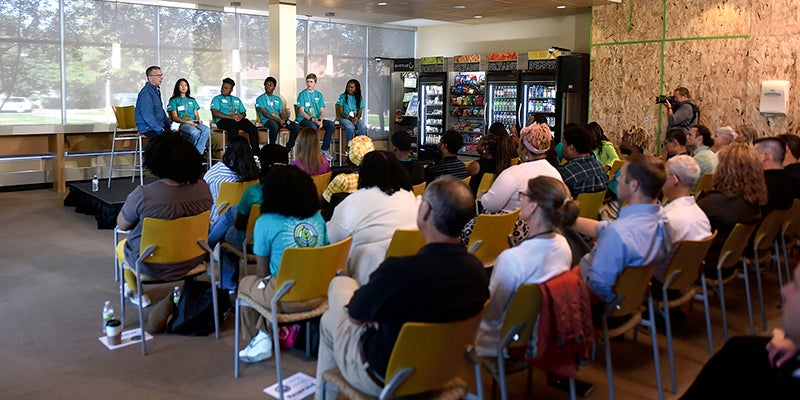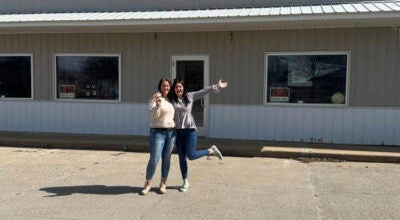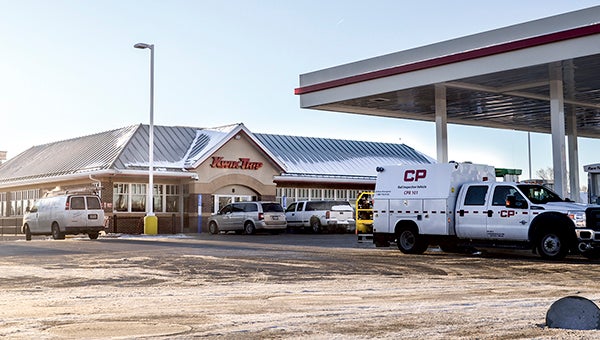PROGRESS 2021: Making the Best of It
Published 11:01 am Monday, March 1, 2021
|
Getting your Trinity Audio player ready...
|
Local businesses spent 2020 adapting to the pandemic
The first confirmed case of coronavirus in Mower County was reported on March 19, 2020, two weeks after the first case was confirmed in Minnesota. As the number of cases began to increase, a series of executive orders from Gov. Tim Walz forced many small businesses to temporarily close or operate with limited capacity.
Prior to the executive orders, businesses started taking measures to prevent the spread of the virus, such as implementing social distancing and frequent sanitation.
“We gave our employees a choice to work; if they didn’t feel safe to work, they didn’t have to,” said Anastasia Fett, who co-owns Fett’s Hutt with her husband Kyle Fett.
“We shut down the gaming area immediately,” Kyle added.
Fett’s Hutt was among those eventually forced to temporarily shut down because of the executive orders. In order to maintain some stream of revenue, they began to look at other options.
“I started exploring moving things online because it was becoming obvious things weren’t going to be opening for a while,” Kyle said. “We set up an online store and we had two weeks where we allowed our employees to come in, but only to ship out orders and for curbside pick-up.”
“(Online) did good, but unfortunately it’s not nearly as good as having people sitting in here and playing because that’s two-thirds of our business; people hanging out and buying snacks and using our space,” he added.
Another source of revenue for the Fetts was an expanded inventory to attract a wider customer base. They also started streaming games online on YouTube and Twitch.
“We expanded because it was a shutdown time; there was nothing to do, so we had to have choices or we wouldn’t make any sales,” Anastasia said.
“You can’t be diverse enough,” Kyle said. “We had to expand and it was terrifying. We’re in kind of an unproven market, we’re two-years-old, and we just completed a huge remodel.”
Other ways local businesses adapted was by offering delivery services and curbside pickup. Sweet Reads owner Lisa Deyo decided to do delivery to residents looking to get through the pandemic with a good book.
“I got to go to the doors in a jacket Peggy Keener made for me and I would sing, ‘And I would walk 500 miles and I would walk 500 more,’ or other ditties that mostly nobody knew to make a fun little treat that they would get with their books,” Deyo said. “I ended up going at all hours of any day of the week to get their books directly to them as soon as they wanted them. Sometimes I would bring a bag and people would choose what they wanted, so it felt like they were shopping. I thoroughly enjoyed it; I felt like a pizza deliverer and now I know all of the neighborhoods.”
Prior to the pandemic, Deyo would help local authors gain exposure by having them come to the store to sign books. But with general public access to Sweet Reads being limited, Deyo decided to move her author events to Facebook Live.
“I found out that doing what we call ‘porch talks’ was a great way to expose our authors to a much greater audience,” she said. “It gave me a chance to interview with authors, which I really enjoy. That turned out to be a real positive.”
“I think part of it too is that people like to look at other people’s yards and it was kind of like you could snoop in on somebody’s yard or porch,” she added with a laugh.
Restaurants found themselves in a particularly difficult situation as they were not allowed to have dine-in for extended periods of time, relying solely on revenue from takeout and delivery sales. When they were allowed to open for dine-in, it was at a limited capacity, a rule still in effect as of the writing of this article.
“We have no indoor dining,” said Sara White, owner of The Tendermaid. “Even now, with the 50 percent, we aren’t big enough to do 50 percent, so we’ve had to continue to have takeout only.”
But one thing that many local restaurants learned was that they live in a very supportive community.
“People have been extremely receptive and adaptive to the new way that we have to do business,” White said. “To be honest, our customers have been extremely supportive. I am so pleasantly surprised that people are really supporting the businesses here in Austin. We can’t thank everybody enough and we’re so grateful.”
To help during the pandemic, Impact Austin stepped forward and began enlisting local businesses to be a part of its gift card program. Under the program, residents were encouraged to purchase gift cards from local businesses to be redeemed when they were reopened, allowing that business to have sources of income while shut down. To sweeten the deal, Impact Austin matched the purchases dollar-for-dollar, which was then given to the Salvation Army.
“One of our team members had seen a similar idea in another community and we adapted it to fit the needs of our community,” said Impact Austin Coordinator Mary Anne Duren. “We went ahead with the idea in April and there are over 50 businesses represented on the website, including the (Austin Area Chamber of Commerce). With all of their businesses, it’s in the hundreds.”
The program was successful, drawing in $60,000 in 2020 for local businesses and an additional $60,000 for the Salvation Army.
“We wanted to make it a community-wide relief effort by supporting businesses, but also helping people who have lost jobs and need help with basic survival like food and rent,” Duren said. “I spoke with Molly Lanke at the United Way as this project was getting started and asked how we could assist people that needed assistance with food or rent and she directed us to the Salvation Army because they have the resources to be able to manage how all of those funds are dispersed.”
Duren said that some businesses told her the program “helped tremendously.”
“Some of them have said they would never have made it through if they did not have these gift cards that kept them going,” she said. “I’m a business owner and I can understand their perspective when they said that 2020 was like starting a business all over again with all of the things you need to learn and adapt and pivot. In needing to make all of those changes, having these gift cards bring in revenue has been one less worry for them to be concerned about.”
Hormel Foods also played a role in supporting local businesses. Duren said Hormel bought $5,000 worth of gift cards to give to their plant professionals and donated $5,000 for the match. In addition, the Hormel Foundation provided the grant money for the dollar-for-dollar matching component for the Salvation Army.
Hormel also consistently ordered large lunch orders for their employees from local restaurants.
“Hormel has blessed so many of us and really kept a lot of people going,” said White, who benefited from Hormel’s business.
The City of Austin also stepped in for local restaurants by offering picnic tables for outdoor dining during the summer months.
“We could have as many picnic tables as we wanted,” White said. “They were in our next-door lot and they were spread out. People were all over that.”
As businesses reopened, it was clear that things would not be “business as usual,” especially with the mask mandate in place.
“We kept the gaming area shutdown and allowed a few people to play here and there so long as they were getting tested – we have a pretty big group of people that come here who have to get tested regularly because of their job,” Kyle said. “We invested a ton in sanitizer and hit every surface multiple times a day.”
Kyle added that any games played were held at a set time and gamers had to adhere to a checklist of criteria in order to play, such as washing hands before playing and before returning to the table. Tables were sectioned off to allow for social distancing and one-way traffic was set up around the store.
But despite the changes, the Fetts, along with other business owners, learned that the community was willing to adjust.
“I don’t think we had a single complaint from any of our regulars,” Anastasia said.
“We’ve had no COVID issues,” Kyle said. “Anybody that even suspects they may have it just stayed away for two weeks. They’ve been super accommodating.”
“We’ve had to tell some people to keep their noses in (their masks),” Anastasia added. “That’s been the biggest issue we’ve had.”
Kyle said there has been an increase in new customers looking to buy board games over the past few months.
“The support has been really good,” he said. “The board games kind of carried us through COVID.”
Deyo said that although her store is open to the public again, she is still willing to continue delivery and curbside pickup.
“I think (delivery is) a practice I will keep as long as I can drive because we have a lot more people that don’t have easy access to shopping,” she said. “All of our curbside deliveries and pickups, they’re really a thing that I think should stay.”
But above all, business owners are grateful for the support they’ve received.
“I just want to thank the community for all of the support they’ve given us,” White said.









